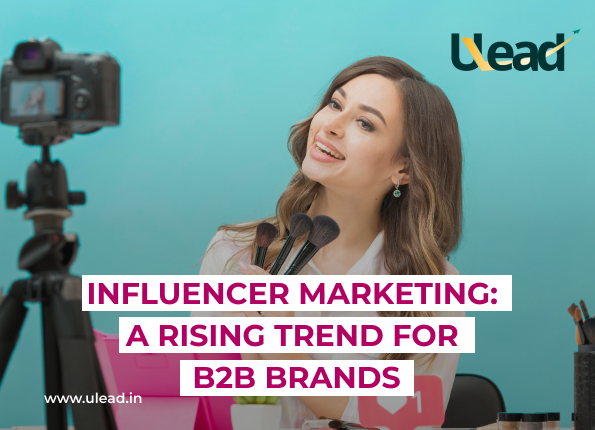Influencer Marketing: A Rising Trend For B2B Brands
The word “influencer marketing” gives an image of fashion, fitness, lifestyle, and food influencers with thousands of Instagram followers and significant brand partnerships. In simple terms, you probably think of B2C brands that want to sell their products and services directly to consumers.
However, this persona is rapidly altering in 2022. B2B companies across various unconventional industries are increasingly turning their tables to influencer marketing to promote their products and services. As a result, product demos and user reviews drive most buying decisions in the B2B space.
In times like these, the importance of Influence is critical for B2B brands that need to connect authentically with their buyers and create meaningful experiences.
Leading influencer marketing trend watchers anticipate this market to surpass $22 billion in revenues by the end of 2022, with a higher figure than branded social media marketing.
While Hubspot’s 2022 Marketing Industry Trends report discovered that influencer marketing was the top strategy marketers plan to use this year.
61% of consumers trust influencers’ testimonials about a brand more than what a brand says about itself. For many B2B companies, influencer marketing can build greater brand awareness, foster consumer trust, and enhance brand loyalty.
How Does Influencer Marketing Work?
Great content is pricey to create, but it rarely gets seen because most companies broadcast it on their channels. Lastly, brands end up paying for distribution and content creation.
However, influencer marketing delivers content creation and distribution for a much lower price. Moreover, it is more precise, engaging and drives ROI at an order of magnitude greater than all other forms of digital media.
“Influencers” justify their name by influencing people. They have built-in audiences and credibility within specific topical areas. People pay attention when these souls speak or write about their expertise. Every industry, whether B2B or B2C, has influencers.
How does B2B influencer marketing work, and how is it different from B2C?
Many business owners have witnessed that paid advertising seems to be getting more expensive and less effective. Enter influencer marketing. Influencer marketing presents the ability to speak on your product’s behalf authentically to benefit your sales go up while costs go down.
However, some critical challenges come with this type of marketing, including scalability, disclosure, and the trend of companies to confuse influence with the audience when selecting persons with whom to align. But the genie is not going back into the bottle. With hundreds of influencer marketing software firms in play, powered by venture capital, this marketing sub-genre will be around for a while.
As with any marketing strategy, there are specific things every B2B tech brand needs to consider when starting an influencer marketing campaign. Below are the top three:
Influencer Marketing Strategy for B2B Brands
1. B2B influencer marketing strategies demand longer timelines than B2C
For a B2C company, you can post a cosmetic item online with an influencer and witness a sales spike within the first 30 days of creating the campaign. But with B2B, purchases can take longer and include more decision-makers. Therefore, the timeline could be six months before the results.
2. Identify your customers
Decide with whom you will be your influencer to become the best voice for your business, even if they have adequate followers.
But particularly for B2B, it’s not all about the numbers. What matters more is the number of followers an influencer has is their audience’s engagement levels. Partnering with a micro-influencer with 1,500 highly engaged followers will almost always be more effective than working with a mega-influencer with fewer comments.
3. Locate the influencers rather than the influencers finding you
Of course, having a perfect-fit influencer approach your brand to start a partnership is a dream come true for most businesses. But realistically, you’ll have to take the first step by researching diverse social platforms or employing a dedicated influencer marketing platform.
The maturity of B2B influencer marketing is equivalent to the growth of content marketing in recent years. After seeing success with one-off efforts, many brands are now integrating influencer marketing into their long-term strategies.
The study showed the results of influencer marketing in B2B below:
- 86% say it’s either moderately or very successful
- 72% say it helped improve brand reputation
- 70% say it improved brand awareness
- 56% say it helped generate new leads
- 33% say it was a direct revenue generator
Looking to become a B2B influencer?
How do you learn if someone is authentic, trustworthy, and credible enough to partner with as a B2B influencer? According to the study, you need to examine beyond vanity metrics like followers and subscribers.
Thus, audience size counts less than audience relevance. The sheer number of followers is less important to marketers than relevance, credibility, and expertise. Those with a huge audience can assist with the reach of a campaign, but it’s critical to include more influential people with smaller audiences.
TopRank Marketing asked survey respondents to rank a list of qualities as Essential, Nice to Have, or Not Important.
Here are the results:
- Relevance of audience (98%)
- Audience sees them as trustworthy (87%)
- Subject matter expertise (78%)
- Values align with the brand (69%)
- Influencer posts on at least one platform (65%)
- Ability to create content (54%)
- Size of the audience (49%)
- Professional credentials (42%)
- Advocate for our brand (33%)
Top B2B Influence Opportunities
Although the B2B influencer marketing space is maturing, there’s still room for growth and more years to come.
The report uncovers the most opportunity lies in strategy development:
- Less than half of B2B marketers say they have a registered influencer strategy
- 28% of businesses say they have an undocumented strategy
- 25% say they have no strategy at all
Read the free report here https://www.toprankblog.com/2022/07/b2b-influencer-marketing-report-22/.
Where B2B Influencer Marketing is Headed in 2022 & Beyond
Within the B2B industry, digital transformation has ramped up over the past few years due to the pandemic. In a recent article, Gartner stated that 80% of sales in the B2B space are now being made digitally. As a result, it influences business and buyer behavior, with most market models being done digitally.
Given a significant online shift in B2B purchase decisions, the essence of leveraging influencer marketing has been increasing. Buyers peek to these trusted individuals to advise and impact their purchase decisions.
Over the next few years, the B2B marketing industry predicts to see more stress on digital engagement. Content remains a central role in the space, and experience and influence will become more dominant than ever. Given this trend, B2B marketers need to scoop the advantage of influencer partnerships and allow content experiences to construct long-lasting brand loyalty and trust.
Now ULead offers a paid online internship program for students to upskill themselves. We empower students to become industry-ready through courses and internships. Enroll now!







